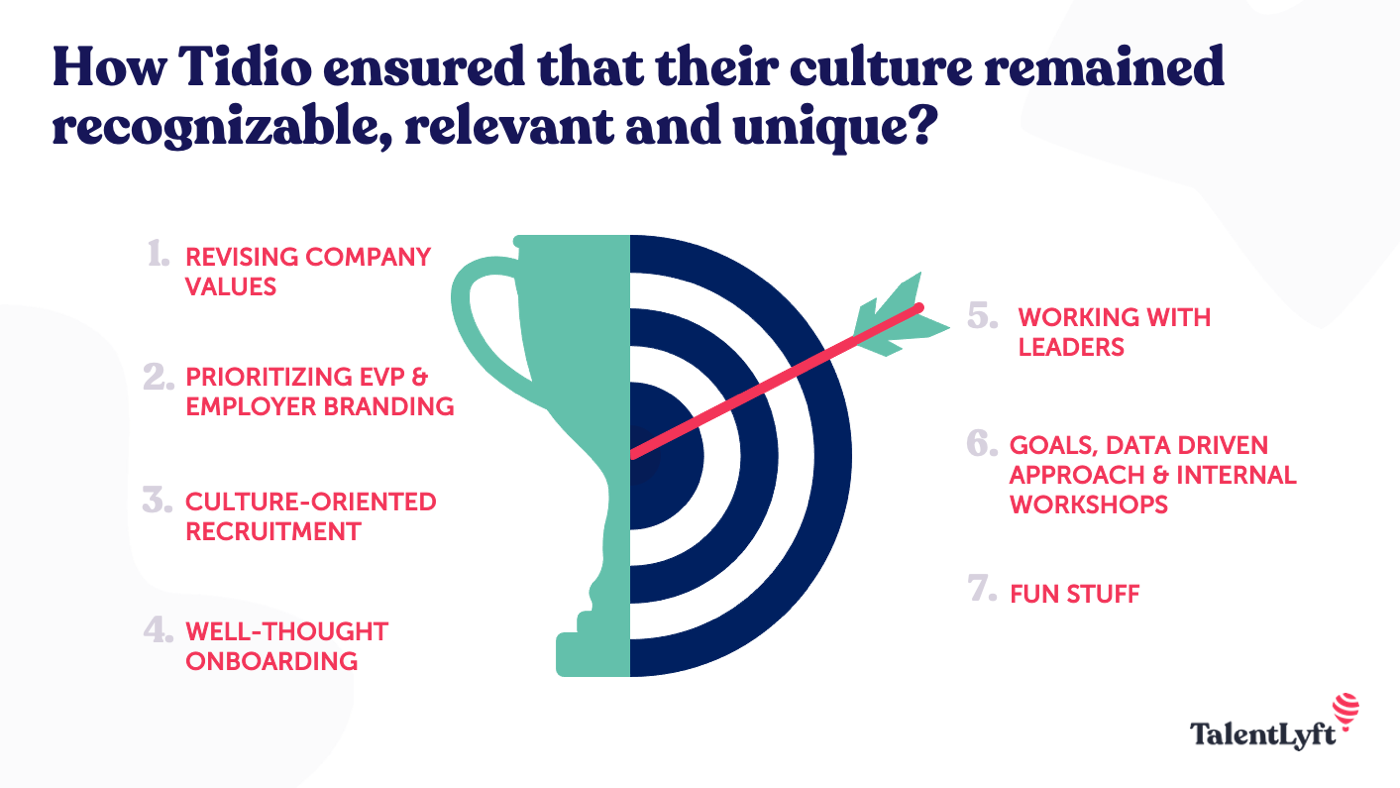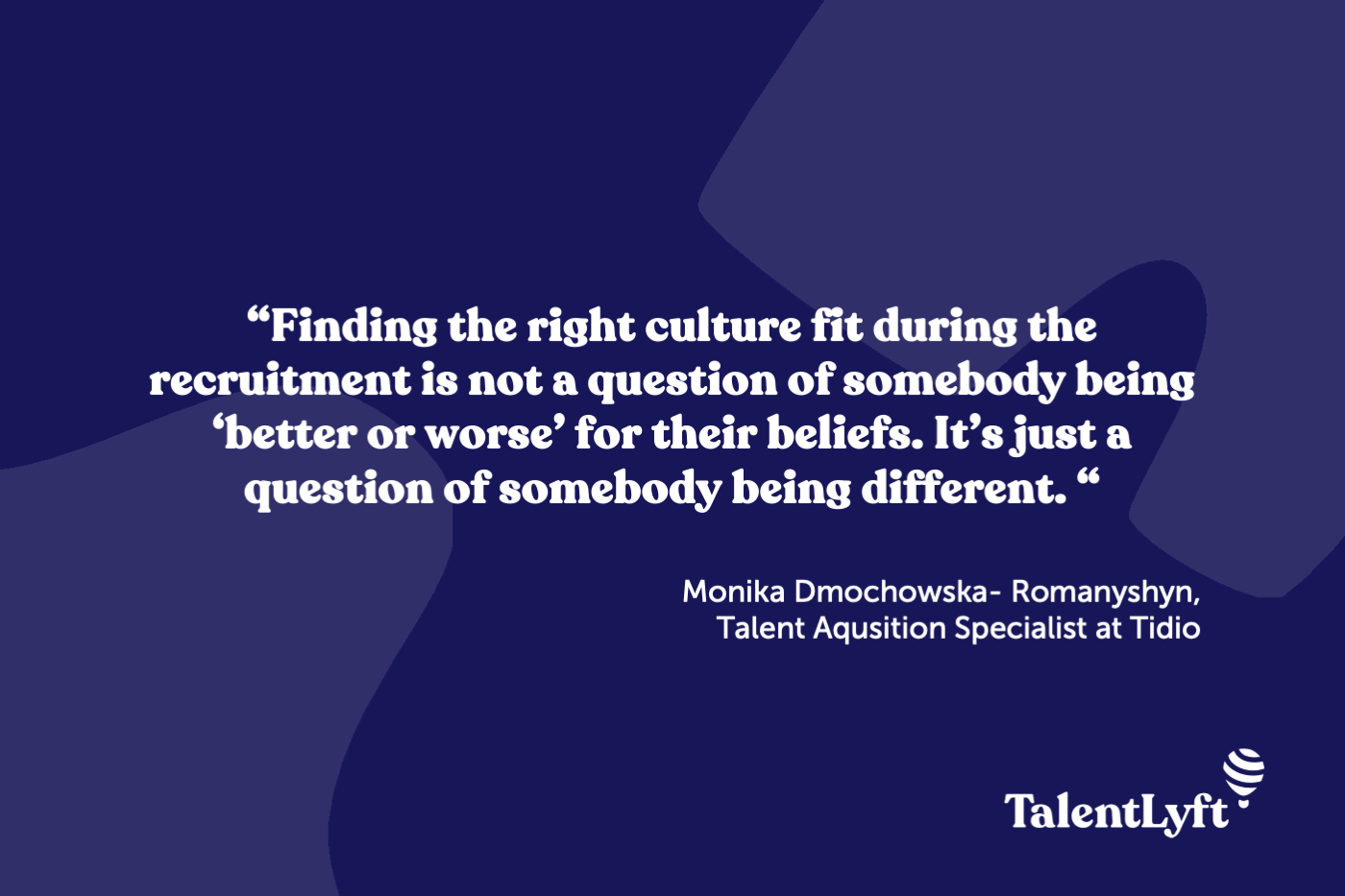![https://adoptostaging.blob.core.windows.net/article/0cGvRKGWPk2OxddHnHDlKA.png]()
Tidio is a customer service platform designed to help its customers grow their businesses. The company entered 2020 with around 40 people on board and finished with more than 80. Currently, there are 120 employees on board, and still growing. However, the changes in headcount were not the only ones we underwent. Tidio is growing in a digital-first model. It was not chosen by design– the truth is, the pandemic forced us to work this way. Before March 2020, we had thought about opening another office in a different city but taking the fully remote approach was not on our radar at that time. In the end, we found that it worked for us.
Of course, our culture had to change. Some fundamentals stayed the same, but we needed to revise what values and culture would help us succeed in the near future, with all the changes. We had to ask ourselves: What kind of company do we want to be as we keep growing?
Doubling the headcount, inevitably impacted the culture. Therefore, in the following paragraphs, we'll focus on explaining our culture and all the changes we've made to maintain it in the fast-growing environment.
So, the question was:
How do we ensure that our culture remains recognizable, relevant, and unique?

Revising company values
We have always stood by our values. However, as the company grew, we found some of them to be a bit outdated. We had to review the company vision and growth strategy while contemplating what kind of company we wanted to be and what characteristics and behaviors could help us achieve that. We spent many hours talking with the Management team and asked our employees what values they consider crucial.
As a result, we developed four core values that resonated with our beliefs and haven’t changed even after hiring almost 100 people. The next step was to ask each team to create their unique 5th value. We realized that the company is full of diverse personalities, and so we wanted to give them a chance to contribute to our culture with something unique.
Many companies make the mistake of copying the values of successful brands without adapting them to their business reality. It’s a losing strategy.
Why?
Values reflect what behaviors will be rewarded, recognized, and looked for in candidates, which is unique for every company and should be built from the ground up.
Prioritizing EVP and Employer Branding
Before starting the employer branding activities, the goal was to understand what kind of culture is already present at the company, so we can boost it from the inside. When the new Employer Branding Lead joined the company, her first job was to define Employee Value Proposition – find out what distinguishes us from other companies and how we can attract new talents. We are a SaaS company and a startup, which is a common business model today. Thus, it was crucial to find what makes us stand out, discover our brand voice, and let others hear us.
Through quality and quantity studies conducted inside the company, we discovered that what describes us best are the growing ambitions that transfer into growth opportunities for each of us. Accordingly, we created a unique slogan marking all employer branding activities.
What’s more, establishing an Ambassadorship Program helped all employees discover their personal brand and give them a chance to develop outside of their comfort zone. They are invited to share their professional expertise by writing articles, providing quotes to renowned websites, or giving a speech at meetups or conferences. As a result, employees grow as professionals, and our brand awareness is improving, too. A true win-win situation!
Culture-oriented recruitment
A considerable part of the recruitment process was dedicated to making sure the candidates match the company culture. By knowing precisely what characteristics are desirable in our newcomers it was important to align their expectations with our culture. This led to highly culture-oriented interviews with almost a third of the time spent on explaining our culture to the candidates.
This approach made the company policy relatively strict when it came to hiring for culture fit. More specifically, we have said ‘no’ to 4% of candidates solely because of the lack of cultural fit. This helped us ensure that despite having different skills, experience, and different professional backgrounds, everyone cherishes the same values.
Are you struggling to assess culture fit among your candidates?
With TalentLyft you can leverage integrated online assessments to hire candidates who will perfectly fit the role requirements and your company culture!
Learn more about online assessments While people can gain knowledge and skills with time and training, their values are something that lies deeper and cannot be changed drastically. For instance, if one appreciates stability and development in a solid environment, a corporation might be a much better choice for them than a fast-growing startup. On the other hand, if the company is ready to offer a passion for growth, learning, and flexibility the person is better off at a startup instead of in a corporate environment. Additionally, every new person joining the team contributes to building a recognizable culture and helps in understanding if it’s time to change specific processes.
Recently, we have hired more than 60 new employees at the company. Interestingly, out of all new hires, only one person resigned in the first three weeks because they felt like it was not a good match in the end.
Cases like this one highlight the importance of prioritizing culture in recruitment. It can happen that people drop out of the hiring process because they realize that they won’t thrive within a certain culture and values - and this is totally understandable.

Well-thought onboarding
Another essential thing for building a great team is to have a very personalized and well-thought onboarding process. When a new person joins Tidio, together with helping them establish their expectations and goals, they are provided with a complete overview of the product and the company. Every new hire has a chance to have a talk with each team’s Head and meet the CEO who explains the vision, mission, and strategy in more detail. By working in a hybrid model and hiring fully remote employees, each new joiner is given an opportunity to spend their onboarding in one of Tidio offices to meet other team members and feel the company’s vibe. If it’s impossible for them to come, we organize the integration online - quality team building is a must with remote employees.
To further promote peer-to-peer knowledge and culture sharing, the next step is launching a Buddy Program. The ‘Buddies’ will help new team members understand what kind of company Tidio is on the inside, what traditions and rituals we share, and what principles we stand by - everything to make new employees comfortable from day one.
Working with leaders
Growing fast inevitably means structure changes, new positions opening, and new leadership roles popping up here and there. Therefore, the goal is to support our leaders, whether it’s their first time in a leadership position or they already have some experience. It’s essential to ensure that all leaders understand the processes, rules, and values in the same way. In the end, it’s them who will lead the teams to ultimate growth.
Additionally, every department has a dedicated person from HR - a Business Partner - who supports them in people-related topics. For instance, a Business Partner is a go-to person when a team member is underperforming or is performing great, and it’s time to think about their next step in development.
To help with the leaders’ development, we established the so-called ‘Leaders Labs.’ It's a series of meetings aimed at sharing knowledge about leadership: how to recruit and onboard people, carry out great 1:1s, set goals, and achieve them. The crucial thing is that it’s neither a presentation nor a monologue, but a mutual knowledge exchange. The goal is to work in groups, brainstorm solutions together, and share experiences. It’s a very interactive project and a big inspiration boost for everybody involved. The labs are also a safe space to discuss complex and controversial topics and establish common ground for what is and isn’t accepted at the company.
Goals, data-driven approach, and internal workshops
No doubt, the trial-and-error approach worked well while we were a small startup. Now, growing so fast, it is important to ensure that every action we take is data-driven and justified by short-term and long-term goals. This drove us to develop our own goal-setting system, which is a tailored interpretation of OKRs. We call it OITs (Objectives, Indicators, and Tasks). It allows us to maximize our goal-achieving potential and keep track of every detail while not forgetting the bigger picture.
Every person in Tidio has access to OITs of everyone and can challenge them. Not only do we see what everyone is supposed to do, but we also celebrate what we have accomplished - each quarter, we organize an event to summarize our achievements and highlight our successes, failures, and lessons learned, with full transparency.
Together with effective goal-setting, workshops for personal and professional development should be a must in every company. Our approach is to stand out by adapting each workshop to the company's values. For example, one of our main priorities is to be fair and honest in everything we do. To achieve this goal, we provide quarterly feedback workshops to build transparent communication, trustworthy relationships, and the feeling of safety inside the company. By prioritizing training dedicated to personality types - such as MBTI, Gallup strength assessment, Insight Discovery, and more we discovered diverse personalities at the company, and learned how to communicate and behave with each other for maximum efficiency and comfort.
Fun stuff
No doubt, being part of a team is not only about work. To ensure a healthy work-play balance, we gladly organize company integrations of different kinds. It can be an online trivia, a company-wide challenge, or getting a surprise box full of candy.
Company culture is here to stay
It’s clear as day that company culture is a flexible concept that changes organically with time and by having new people joining the team. So, let’s summarize the main takeaways:
Make sure you know what you are as a company and where you are going. Establish your values carefully and make sure they represent your culture, values, and strategy;
Pay a lot of attention to hiring people who fit into the culture. Pay even more attention to hiring recruiters – in the end, they will be responsible for acquiring talents and checking their cultural fit.
When working with culture, make data-driven decisions, gather feedback, and be flexible.
Make sure that leaders are aligned with your culture and values and reflect them in communication with their teams.
Don’t forget that culture is not only about work - make sure your company integrations are in tune with your values, too.
We would like to summarize the article with a legendary quote by Peter Drucker that says:
“Culture eats strategy for breakfast”.
Because, no matter how strong your ideas and plans are, and how diverse and knowledgeable your team is, little can be achieved without cultural alignment, especially in times of growth and turbulence.
Author’s bio
Ewelina Melon is the head of People and Culture at Tidio. She has more than ten years of HR experience and is always happy to share it. Being a pragmatic startupper and quality-focused professional, she finds her passion in helping people develop and companies grow.
















![8 Ways Corporate Merchandise Inspires Workers [INFOGRAPHIC INCLUDED]](https://adoptostaging.blob.core.windows.net/article/0plWRulhpE2dFBvZ3XIloQ.png)

